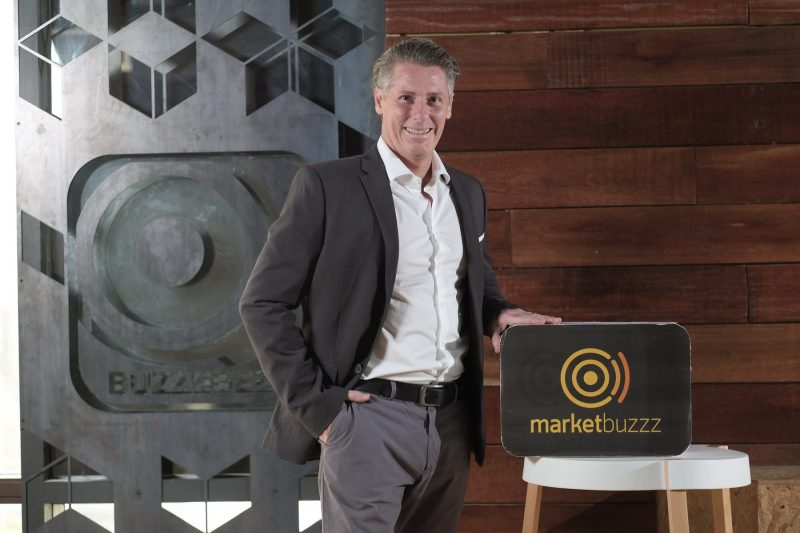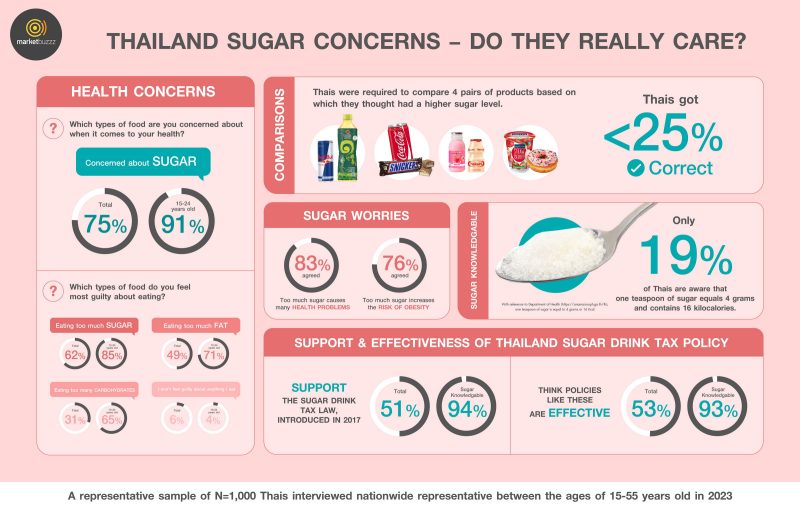Over this new year time and a heightened sense of health-consciousness, Marketbuzzz conducted a survey among n=1000 Thais aimed at gathering valuable insights on their awareness and knowledge of their sugar consumption habits.
On the whole, the survey highlighted that Thais are concerned with sugar consumption with 75% of Thais claiming to be most concerned about sugar consumption in regard to their health. And this jumps to 91% among the younger generations, particularly those aged between 15 to 24 years who have heightened concerns about sugar levels in their diets.
In fact, the guilt of eating too much sugar is highest of the food types compared with too much and too much carbohydrates. 62% of Thais feel guilty about the consuming too much sugar compared to 49% who feel guilty about too much fat and only 31% feel guilty about eating too many carbohydrates.
Again, it's the younger ages of 15 to 24 years old who are also those with more guilt when eating too much sugar, fat and carbohydrates compared to the older age Thais with 85% of 15 to 24 years old felt guilty about eating too much sugar compared to 62% for all ages. This heightened concern among the younger generation reflects a broader shift towards a more-health conscious and informed approach to nutrition.
What are Thais concerned about with the impact of too much sugar? The two main reasons are increasing health problems associated with sugar intake and the increased risk of obesity. 83% of Thais agree that excess sugar can lead to an increase of many health problems and 76% agree that excess sugar increased the risk of obesity.
With the aim of reducing health impact from sugar consumption, Thailand have implemented a new tax in 2017 on drinks which contain more than 6 grams of sugar per 100ml. In the survey, over half (51%) of Thais supported this tax law with 53% also thinking these types of policies are effective. However, it's really only those who are very knowledgeable about the amount of sugar in products that are generally supportive and think the new sugar tax policies are effective.
Are Thais really aware of how much sugar they are actually consuming in their day-to-day lives?
Even with the introduction and support of these tax policies, the impact on how this changed Thais views on sugar (in their day to day products) appears to be less influential.
It's evident that most Thais don't know the actual amount of sugar they are consuming despite being concerned. In the survey, Thais were shown 8 different products commonly consumed by Thais and the products were compared to verify whether they knew which had the highest sugar content. The 8 products were Coca Cola Can (325ml), Snickers Chocolate Bar (47g), Dutchie Strawberry Yoghurt (135g), Dunkin' Donut (50g), Red Bull Energy Drink (250ml), Ichitan Original Green Tea (420ml) and Yakult Probiotic Drink (80ml) and a Meiji's Pasteurized Strawberry Flavoured Milk (200ml). And the main finding: less than 25% of the Thais could pick the correct products with the highest sugar.
In addition, more than 4 out of 5 Thais don't know the teaspoon equivalent of a gram of sugar and/ or the calorie equivalent (one teaspoon of sugar equals 4 grams and contains 16 kilocalories). While this test is more challenging, both of the tests indicate that despite being aware of the risks and expressing their concerns with the effect of high sugar consumption on their health, it doesn't translate further in knowing and understanding the amount of sugar they could be consuming on a daily basis.
We're often told about the concerns of increased sugar intake but if we look specifically at what is contributing to excess sugar intake, there is firstly a wide range of available products and they are easily accessible. There is easy access to sugary products, perhaps even more so than lower-sugar ones. Also they are affordable, which is positive if all food is cheaper and more affordable, and people can start making healthier choices but its an issue when the cheaper products tend to be the higher-sugar products.
According to Mr. Grant Bertoli, CEO of Marketbuzz, "These findings suggest it doesn't mean the end of sugary products or the end of sugar in our lives in the short term future. However, we do need to think differently, and food manufacturers will need to continue to look at their product ingredients and their brand propositions and the need for measured adjustment to their packs including more prominent nutritional guidelines and claims for low sugar / no sugar product branding and packs"
Mr. Grant Bertoli added, "Overall, it is clear that consumer demand will drive sugar reformulation efforts and healthier options. However, there is a need for a major push from all concerned, including food brands, Food & Drug Administration, associations and medical professions, and enforcing changes to product recipes and product declarations and the media which will help influence consumer attitudes. While there is plenty of products available and big differences in the amount of sugar between the products continuing to raise awareness and knowing the difference in the amount of sugar a product contains is an important first step and then its ultimately up to the individual on which product they buy."
The scientific understanding and the consumer beliefs surrounding sugar is changing, albeit slowly. The food brands that will thrive are the ones who recognise this shift and react sooner rather than later. People will very likely continue to indulge in sugary products in the future but at least they will do so by being more informed.
Source: BUZZEBEES

